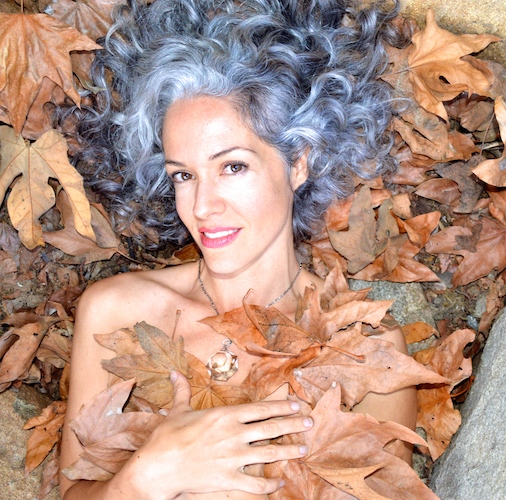On my long journey of spiritual inquiry, I have often encountered the idea, from various teachers and systems, that the body is some kind of unsavory thing—ranging from an illusion to a nuisance to a virulent monster—that we must somehow “overcome” on the way to “true” enlightenment.
As someone who dances her way to a state of decidedly sensual holiness each and every day, I must say this idea makes me feel, well, icky. How can we love ourselves if we are taught to hate our own bodies? How can we be present if we don’t love every aspect of our incarnation? How can we embrace wholeness if we are artificially fractured into the false duality of “spirit” and “body”?
For example, trendy spiritual texts, such as, A Course in Miracles make assertions like the following:
“The ego’s fundamental wish is to replace God. In fact, the ego is the physical embodiment of that wish. For it is that wish that seems to surround the mind with a body, keeping it separate and alone, and unable to reach other minds except through the body that was made to imprison it.” (ACIM, Lesson 72)
Here we clearly see the prevalent idea that the pristine, pure mind is “imprisoned” by the body, which is of course the evil hench-person of the ego, which in turn seeks to “replace God.”
Um. Are red flags going up for anyone else?
Despite being packaged covertly in the guise of hip “new” spiritual philosophies, this conception of the body as inferior to or less “real” than the spirit is actually not new at all, but rather traces back many thousands of years to the genesis of patriarchal religion in ancient Greece, circa Plato (notably: right about the same time that matriarchal, Earth-based religions were systematically destroyed by these same forces).
At that particular juncture in human history, religion (in my humble opinion) ceased to be a celebration and worship of the mystery of creation in full, and became instead geared toward harnessing the power of the populous and separating people from their own access to divinity in order to route power through a hierarchical, centralized source.
The ACIM quote cited above can clearly be seen as a re-packaging of much older texts, such as this Pauline passage in Romans:
“For I know that in me, that is, in my flesh, dwelleth no good thing: for to will is present with me, but to do that which is good is not.” (Romans 7:18)
It is essential to note that the long-running loathing and negation of the body is really, at its core, a hatred—and even more deeply an abject fear—of the feminine. It is a fear of the messiness and unpredictability of the body and the Earth herself, a fear of the mystery of the womb and the creative power that it holds, and above all a fear of that most mysterious of all rites of passage: death. It is the fear that the mind of mankind holds of all things deep, dark, shadowy and unknowable.
And yet, because we all have aspects of this powerful, dark feminine force within (men and women alike), and because creation itself deeply depends on this force, any philosophy or religious system that even slightly negates the body inexorably leads to a false division of the self, to self-loathing, and an impaired ability to recognize and celebrate the fullness of one’s own light.
After all, what better way to control the population and route their power through a central institution than by suggesting that they ought to hate themselves; that they, simply by way of being embodied, are inherently sinful, imprisoned and weak?
Moving forward into the contemporary era, in which so many are seeking and finding their own spiritual paths, there are still many people that, as yet, dislike their bodies and/or are enmeshed in body issues. I am personally acquainted and in close dialogue with literally hundreds of women and men who struggle with body-image and self-love. And, of course, I have my own complex history with the same…a story for another day.
In this era of relative freedom and seeking, I find it somewhat surprising that it is still taboo to say what I am about to say (which is precisely why I am saying it). So without further ado, I hereby declare:
I really, really love my body.
I love the biological marvel that it is; I love that it hums like a tuning fork; I love that it gave birth to some of the cutest people on Earth; I love that it has gotten sick and somehow miraculously knew how to heal itself; I love that it is an absolute, fluid extension of the Earth.
I love my body heat, and that it has the power to convey Love. I love how I can dance, and while dancing, move energy in a most exotic and mysterious fashion.
I love that water magically comes out of my eyes when I’m sad.
I love that the way my body commands a room when I work my badass power walk.
I love my nostrils, love handles and bunions.
I love my signs of aging, my stretch marks, my silver hair, my laugh crinkles, my rounded places, my visible breath in the cold air.
I love that, given all the reasons to close out of fear, my body chooses—albeit awkwardly and shyly at times—to heal and open once again, to express and receive Love in full.
My body is absolutely holy. It is a secret, sacred portal to the Divine. I hold the power of creation in my womb, I hold the light of stars in my cells. I have Heaven inside of me, and it radiates from my eyes and fingertips.
There is nothing to negate, escape, alter or judge in this elegant form of mine. There is nothing unclean; nothing less than beauty.
My body is completely innocent of “perfect,” and instead is simply itself. What cause for celebration.
And guess what, I feel the very same way about you, and yours! I love your body.
So there you have it. If you feel inspired to post what you love about your body in the comments below, I will be so honored to delight in the brilliant, scintillating miracle of time and space and energy and form that you are: body, spirit and all.
All is holy; All is One.
~
~
~
Author: Sara Sophia Eisenman
Editor: Travis May
Photo: Provided by Author







Read 7 comments and reply